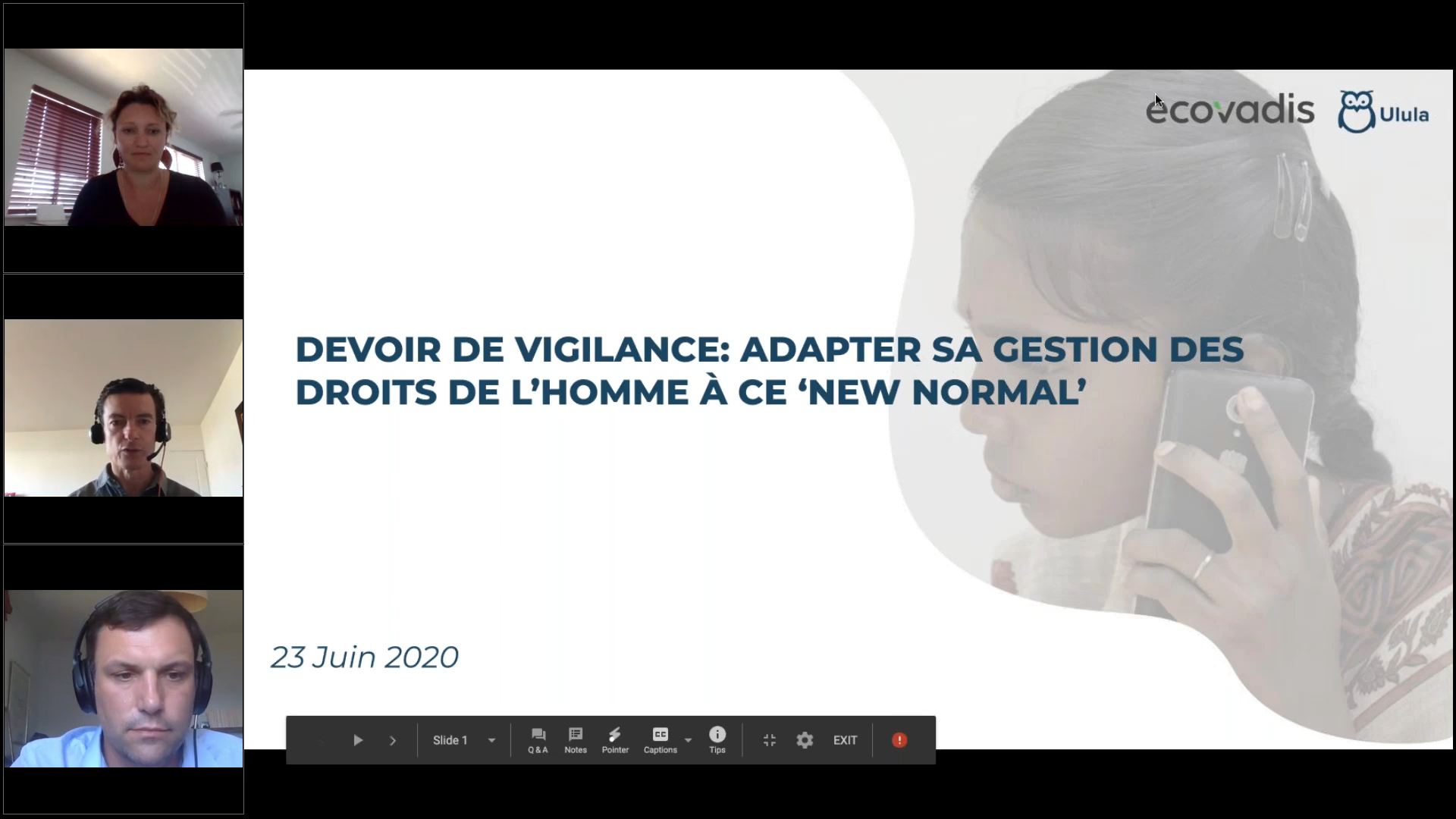Below is the webinar summary in French, followed by English.
To watch the webinar recording in French, click here .
How to manage human rights in a constantly changing world?
Here is the complex question we tried to answer with EcoVadis and Mars during our webinar on June 23 with the support of the CNA National Purchasing Council .
“The COVID-19 crisis has significant consequences on societal risks and their management by large companies” explains Antoine Heuty , CEO of Ulula. Production sites are difficult to access, working conditions are severely affected and constantly changing, and many workers face complicated personal situations. So many issues that show the need to bring responsiveness and agility to traditional systems of human risk management.
Asked during the webinar on “How to adapt their human rights management system to this ‘new normal’?”, 59% of brands responded that they wanted to establish an alert management mechanism in their supply chains and 34% wish to monitor working conditions more frequently.
Aurélie Gouverneur of the Mars group shared her feedback on the use of Ulula’s Worker voice tool and its integration into the deployment of the ‘ Next Generation Supplier ‘ program in the factories of certain suppliers, in particular around well-being Workers. ‘ Via the worker voice, we want to diversify the types of questions we ask and carry out more regular checks in order to measure trends, ‘ she shares.
Companies can deploy the Ulula solution as a complement to EcoVadis to benefit from a more global vision of the CSR performance of their supply chain. Nicolas Dussert of the EcoVadis group , underlines the importance of the supplier relationship in the implementation of the tool: “ The use of collaborative tools like Ulula must aim at the supplier’s commitment over time, which implies a balanced supplier relationship. , a committed general management, without forgetting the digitization and voluntary and trained purchasing teams. ”
Ulula’s Worker voice tool helps companies better understand the evolution of human risks in a constantly changing world. Questioning workers directly by telephone on their working conditions enables precise knowledge of the situation in the field and remotely. The repetition of these surveys makes it possible to measure the evolution of these risks in real time. It also allows the establishment of large-scale alert management mechanisms in supply chains.
To watch the webinar again, here is the link to the recording.
To find out more about the solution and find out about Ulula’s upcoming events, here is the link to the newsletter. Link to Ulula and EcoVadis webinar in English.
Note: Quotes were translated from French.
How can companies manage human rights in a constantly changing world?
This is the complex question that we tried to answer with EcoVadis and Mars during our webinar on June 23 hosted with the support of CNA Conseil National des Achats .
“The COVID-19 crisis has significant implications on social and labor risks and how businesses can manage them” explains Antoine Heuty , Ulula’s CEO. It has caused business closures and devastated working conditions around the world. Travel restrictions have made it difficult to access production sites in-person and many workers face increasingly complicated personal situations due to the changing circumstances of the pandemic. These challenges underscore the need for organizations to introduce innovations that incorporate responsiveness and agility into traditional human risk management systems.
During the webinar, participants were asked about how they plan to adapt their human rights management system to this ‘new normal’, to which 59% of brands responded that they wish to establish an alert management mechanism in their supply chains, and 34% wish to monitor working conditions more frequently.
Aurélie Gouverneur from Mars shared her feedback on Ulula’s worker voice tool and how it has been integrated into the ‘Next Generation Supplier’ program . Mars introduces the tool into select factories of certain suppliers with the intention of collecting information on the well-being of workers. “ Via worker voice, we want to diversify the types of questions we ask and make more regular checks to measure trends, ” she shares.
Companies can deploy Ulula’s worker voice solution as a complement to EcoVadis sustainability ratings to benefit from a more global view of the CSR performance of their supply chain. Nicolas Dussert f rom EcoVadis , underlines the importance of the supplier relationship in the implementation of the tool: “ The use of collaborative tools like Ulula depends upon the supplier’s commitment over time, which implies a balanced supplier relationship, committed senior management, not to mention digitalization and trained and voluntary purchasing teams . ”
Ulula’s worker voice tool helps companies better understand the evolution of human rights and labor risks in a constantly changing world. Directly questioning workers about their working conditions by mobile phone allows companies to assess the situation on-the-ground in real time and from a distance. Deploying recurring worker voice mobile surveys over time makes it possible to measure the evolution of these risks over time. It also enables the implementation of large-scale alert management mechanisms in supply chains.
To watch the webinar recording in French, click here .
To learn more about Ulula’s worker voice solution and to receive updates on upcoming events, subscribe to our newsletter . Watch our webinar announcing our partnership with EcoVadis.

